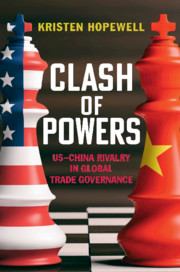Book contents
- Clash of Powers
- Clash of Powers
- Copyright page
- Contents
- Figures
- Tables
- Acknowledgments
- Introduction
- 1 The Doha Round Impasse
- 2 The New Politics of Agricultural Subsidies: A US–China Battle
- 3 The Dragon in the World’s Oceans: Fisheries Subsidies
- 4 Beyond the WTO: Erosion of the Export Credit Arrangement
- 5 Negotiating in the Dragon’s Shadow: Export Credit for Coal Plants
- Conclusion
- Notes
- References
- Index
3 - The Dragon in the World’s Oceans: Fisheries Subsidies
Published online by Cambridge University Press: 21 January 2021
- Clash of Powers
- Clash of Powers
- Copyright page
- Contents
- Figures
- Tables
- Acknowledgments
- Introduction
- 1 The Doha Round Impasse
- 2 The New Politics of Agricultural Subsidies: A US–China Battle
- 3 The Dragon in the World’s Oceans: Fisheries Subsidies
- 4 Beyond the WTO: Erosion of the Export Credit Arrangement
- 5 Negotiating in the Dragon’s Shadow: Export Credit for Coal Plants
- Conclusion
- Notes
- References
- Index
Summary
Amid widespread concern about the role of subsidies in the depletion of global fish stocks, the UN Sustainable Development Goals identified achieving a WTO agreement to restrict fisheries subsidies as a major international priority. Seen as an important means for the WTO to contribute to addressing a pressing global development and environmental issue, and thus resuscitate the institution following the Doha Round collapse, fisheries subsidies have been the subject of intense negotiating efforts at the WTO. However, the key issue of contention is how China and other large emerging economies should be treated under any new disciplines. The fisheries subsidies issue sharply underscores the problem with extending special and differential treatment (SDT) to China: since China now has the largest industrial fishing fleet in the world and provides the greatest volume of subsidies, exempting its subsidies from disciplines would severely harm the sustainability of global fisheries. Efforts to negotiate a standalone agreement on fisheries subsidies have run aground amid this central issue of dispute. The result has been a failure to arrive at new disciplines, the consequences of which are felt most keenly by poor developing countries whose populations are heavily dependent on fisheries for food security, livelihoods, and exports.
Keywords
Information
- Type
- Chapter
- Information
- Clash of PowersUS-China Rivalry in Global Trade Governance, pp. 94 - 132Publisher: Cambridge University PressPrint publication year: 2020
